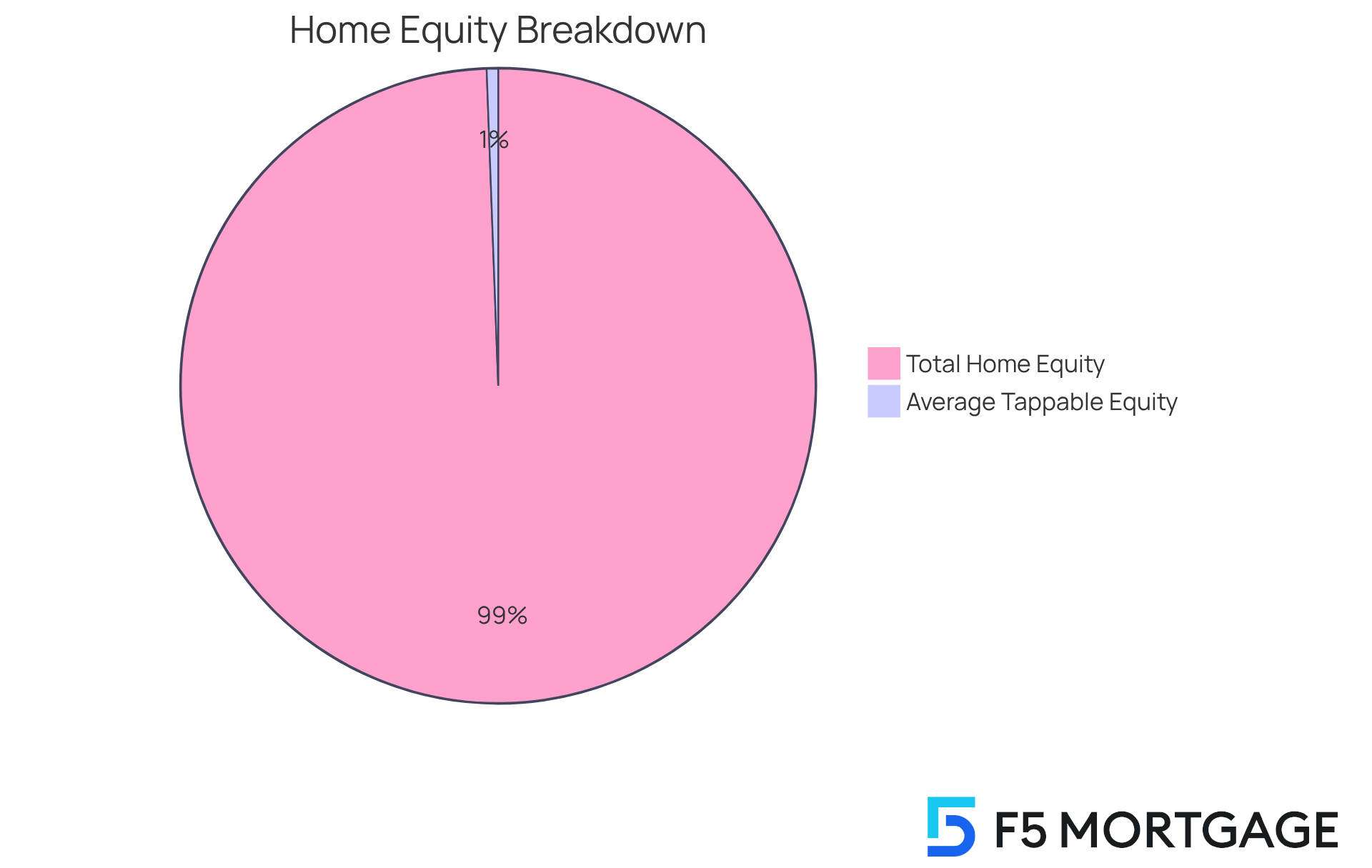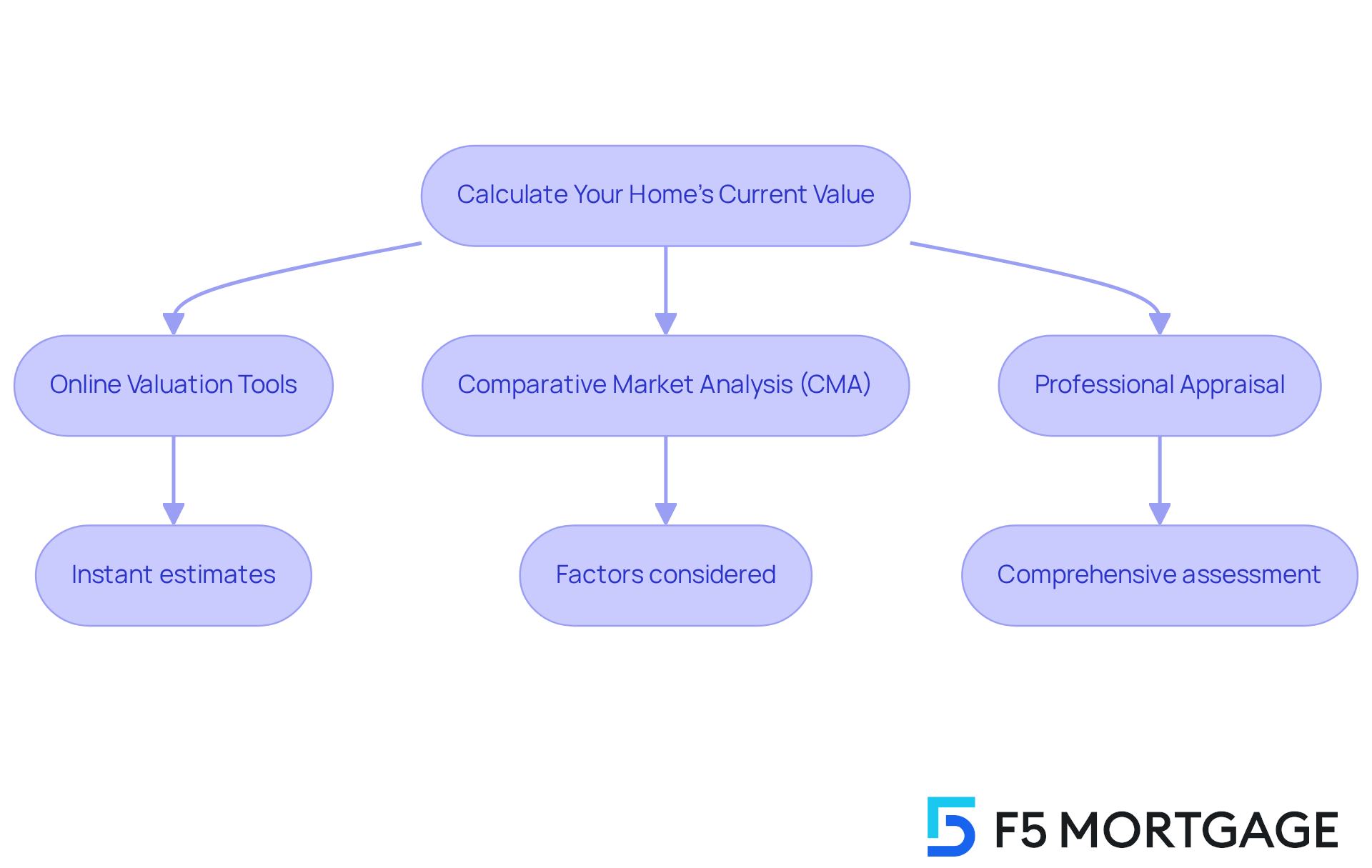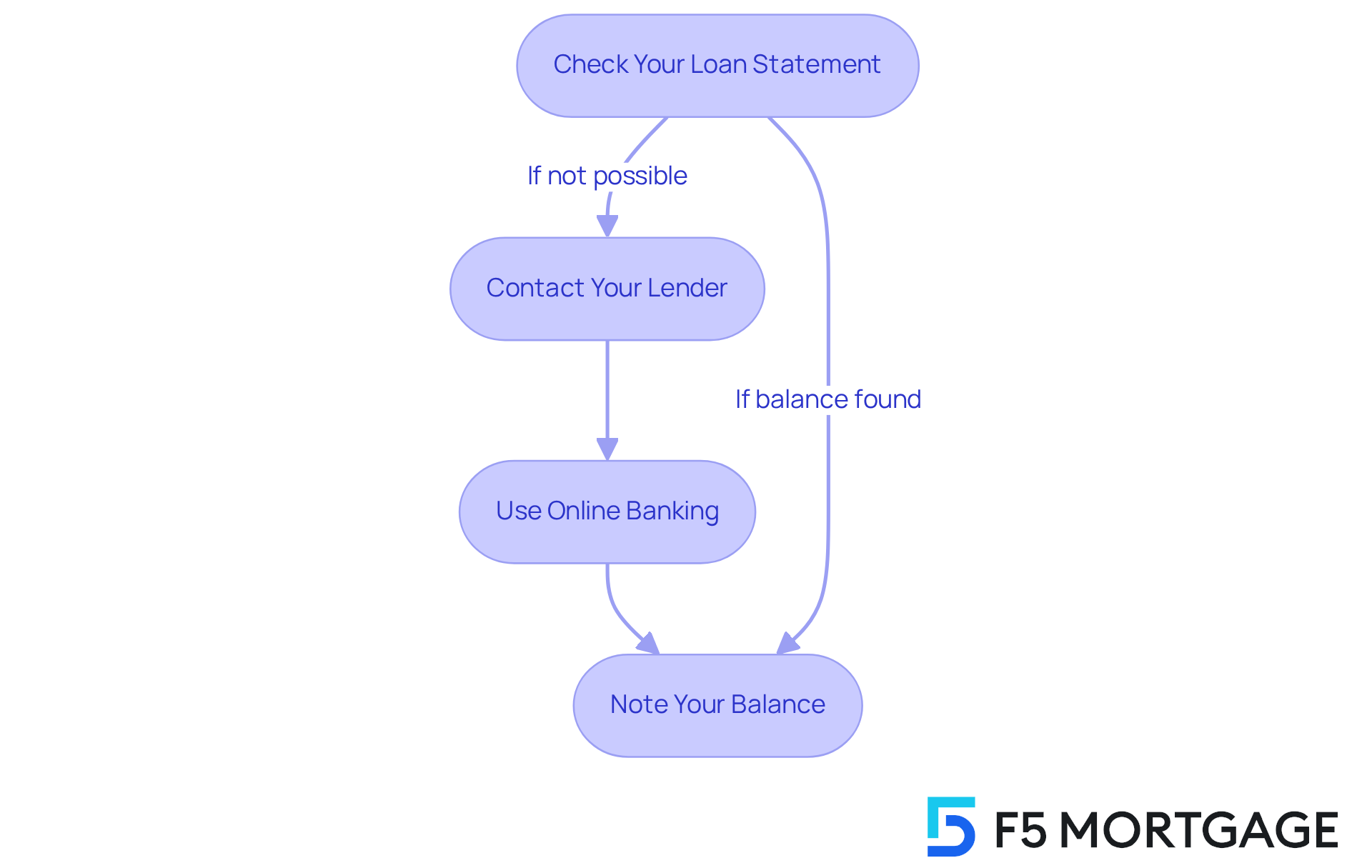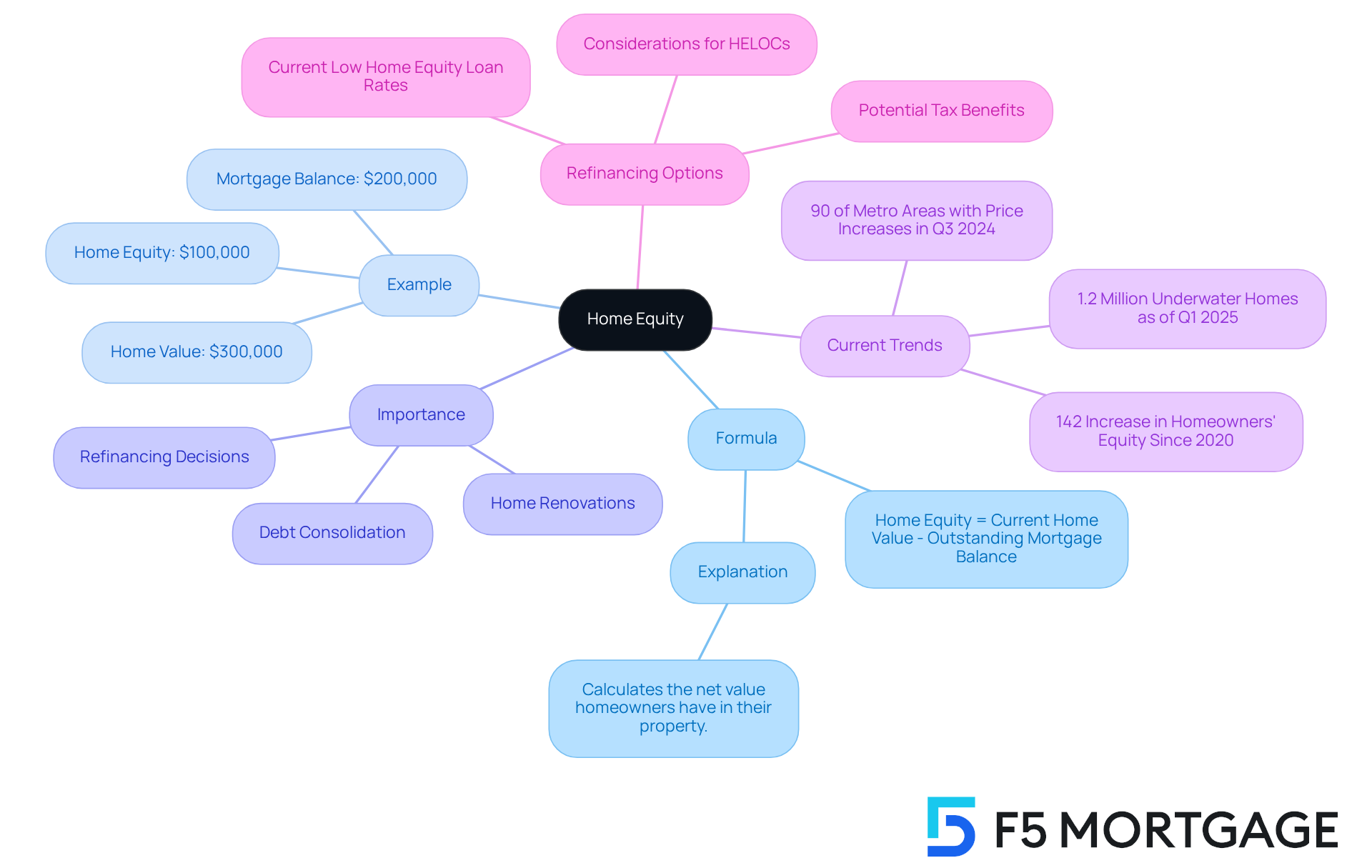Overview
Understanding the equity in your home is essential for your financial well-being. To calculate it, simply subtract your outstanding mortgage balance from the current market value of your home. We know how challenging this can be, but this calculation is crucial for grasping your financial standing. It empowers you to make informed decisions regarding:
- Loans
- Refinancing
- Wealth building
Remember, home equity plays a significant role in personal finance, and we’re here to support you every step of the way.
Introduction
Understanding the equity in a home is not just a financial exercise; it’s a significant step toward unlocking the potential of one of the largest assets many individuals will ever own. Home equity represents the portion of a property that homeowners truly own. We know how challenging it can be to navigate this landscape, but grasping how to calculate it can open doors to vital financial opportunities, from home improvements to debt consolidation.
Yet, with fluctuating property values and varying mortgage balances, how can one accurately assess their home equity and leverage it effectively? This guide delves into the essential steps for determining home equity, empowering homeowners to make informed financial decisions that can enhance their overall wealth. We’re here to support you every step of the way as you embark on this journey.
Define Home Equity and Its Importance
Understanding how to determine equity in home is essential, as it represents the portion of your property that you fully own. To understand how to determine equity in home, you subtract any remaining mortgage balance from your home’s current market worth. For instance, to understand how to determine equity in home, if your home is valued at $300,000 and you owe $200,000, your equity amounts to $100,000. This asset can be a lifeline for various financial needs, such as home improvements, debt consolidation, or funding education.
As of Q4 2024, U.S. households collectively hold a staggering $34.7 trillion in property value. Recognizing the significance of this asset is vital for enhancing your financial well-being and building wealth. Your home value serves not only as a financial resource but also as a cornerstone for long-term wealth growth. Homeowners can access an average of $203,000 in available assets as they approach 2025, highlighting the potential of property equity.
By acknowledging how to determine equity in home, you empower yourself to make informed decisions that can significantly enhance your overall financial plan. We know how challenging navigating these financial waters can be, but we’re here to support you every step of the way. Take charge of your financial future by understanding and leveraging your property value today.

Calculate Your Home’s Current Value
Understanding your home’s current value is crucial, and we know how challenging this can be. Here are some methods to help you navigate this process:
-
Online Valuation Tools: Consider using platforms like Zillow or Redfin. They provide instant estimates based on recent sales data in your area. While these tools can give you a quick glimpse of your property’s value, it’s important to remember that their precision can vary. For instance, Zillow reports a median error rate of 2.4% for listed properties.
-
Comparative Market Analysis (CMA): Engaging a real estate agent for a CMA can be a valuable step. This analysis compares your home to similar properties that have recently sold, taking into account factors like square footage, the number of bedrooms and bathrooms, and unique features. A well-executed CMA often provides a more tailored and accurate valuation than online tools, giving you peace of mind.
-
Professional Appraisal: For the most precise assessment, hiring a licensed appraiser is advisable. Your lender will arrange a property appraisal to ascertain the current market value of your asset. This process shows how to determine equity in home and can influence your mortgage rates. Appraisers conduct comprehensive assessments, utilizing public records and neighborhood information to determine your property’s value. While appraisals typically range from $300 to $400, they offer a thorough valuation that lenders rely on, ensuring that your property’s value is accurately represented.
By employing these methods, you can understand how to determine equity in home and obtain a reliable estimate of your home’s value. This knowledge is essential for effectively calculating your home equity and making informed decisions for your family’s future.

Determine Your Outstanding Mortgage Balance
Understanding your outstanding mortgage balance is an important step, and we know how challenging this can be. Here’s how you can easily find this information:
- Check Your Loan Statement: Your monthly loan statement typically contains the balance due. Look for the section labeled ‘Outstanding Principal’—this is where you’ll find the figure you need.
- Contact Your Lender: If you can’t locate your statement, don’t hesitate to reach out to your loan provider directly. They are there to help and can provide you with the most up-to-date balance.
- Use Online Banking: If you have online access to your loan account, simply log in to view your current balance. It’s a quick and convenient way to stay informed.
Make sure to note this figure, as it will be essential in how to determine equity in home during the final calculation of your property value. Remember, we’re here to support you every step of the way.

Calculate Your Home Equity: The Final Equation
To understand how to determine equity in home, we know it can feel overwhelming. Start by using this straightforward formula:
Home Equity = Current Home Value – Outstanding Mortgage Balance
For instance, if your home is valued at $300,000 and your outstanding mortgage balance is $200,000, your calculation would be:
Home Equity = $300,000 – $200,000 = $100,000
This indicates that you have $100,000 in equity available for potential loans or other financial needs. Grasping how to determine equity in home is crucial, as it plays a significant role in decisions concerning refinancing, home renovations, or consolidating high-interest debt.
With present mortgage rates in Colorado decreasing, now is a favorable moment to consider how to determine equity in home and how this asset can benefit you, particularly if you are seeking to refinance. Refinancing can lead to reduced monthly payments and possible tax benefits, making it a strategic monetary decision.
In 2025, many homeowners are gaining from positive value, utilizing it for various financial strategies. Significantly, property owners’ ownership stakes have increased 142% across the country since 2020, and nearly 90% of urban regions recorded price rises in the third quarter of 2024.
However, we know how challenging it can be to recognize the risks linked to negative asset value. As of Q1 2025, there are roughly 1.2 million properties with negative worth in the U.S. As Satyan Merchant, a senior vice president at TransUnion, observes, “When a consumer has the resources available and meets the criteria of what a lender seeks, property loans or HELOCs remain a favorable option.”
We’re here to support you every step of the way. Explore how to determine equity in home by considering the refinancing options available through F5 Mortgage to maximize your benefits.

Conclusion
Understanding how to determine equity in your home is crucial for effectively managing your personal finances. Home equity represents the portion of your property that you own outright. Recognizing its significance can empower you to leverage this asset for various financial opportunities. By calculating equity through the straightforward formula of subtracting your outstanding mortgage balance from your home’s current market value, you can gain a clearer picture of your financial standing and make informed decisions.
Throughout this article, we discussed essential methods for assessing home value, including:
- Online valuation tools
- Comparative market analysis
- Professional appraisals
Each approach offers unique insights that contribute to a comprehensive understanding of home equity. Additionally, we highlighted the importance of staying informed about your mortgage balance and the potential benefits of refinancing in a favorable market. Together, these elements emphasize the value of home equity as a financial resource that can facilitate home improvements, debt consolidation, or funding education.
The journey to understanding home equity is not just about numbers; it’s about taking control of your financial future. By actively engaging with these calculations and leveraging the insights shared, you can unlock the potential of your property value. As the real estate market continues to evolve, staying informed and proactive about home equity can lead to significant financial advantages. Embrace the opportunity to explore your home equity options and consider how this valuable asset can work for you, enhancing your overall financial well-being.
Frequently Asked Questions
What is home equity?
Home equity is the portion of your property that you fully own, calculated by subtracting any remaining mortgage balance from your home’s current market value.
How do you determine the equity in your home?
To determine equity in your home, subtract your remaining mortgage balance from your home’s current market worth. For example, if your home is valued at $300,000 and you owe $200,000, your equity would be $100,000.
Why is home equity important?
Home equity is important because it represents a significant asset that can be used for various financial needs, such as home improvements, debt consolidation, or funding education, and it plays a key role in enhancing financial well-being and building wealth.
What is the total property value held by U.S. households as of Q4 2024?
As of Q4 2024, U.S. households collectively hold a total property value of $34.7 trillion.
How much equity can homeowners access on average as they approach 2025?
Homeowners can access an average of $203,000 in available assets as they approach 2025.
How can understanding home equity benefit homeowners?
Understanding home equity empowers homeowners to make informed financial decisions, which can significantly enhance their overall financial plan and help them take charge of their financial future.








